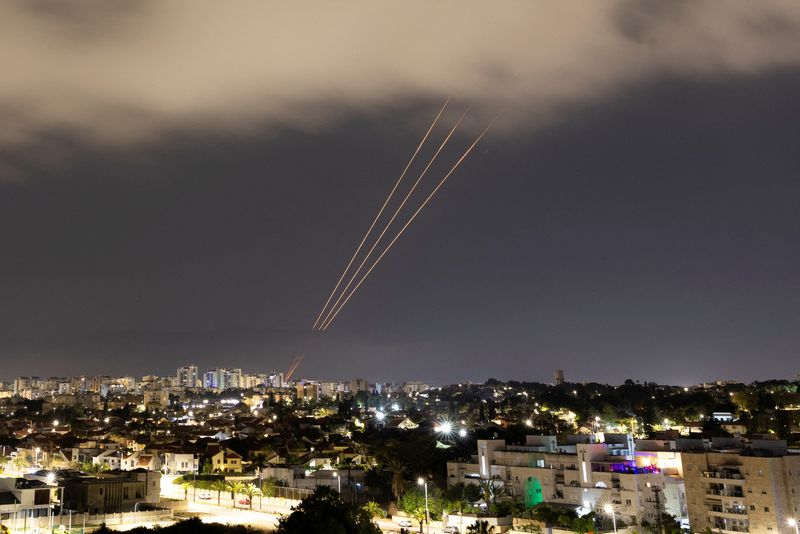By Dan Williams, Parisa Hafezi and Jeff Mason
JERUSALEM (Reuters) – Iran’s top commanders warned Israel on Sunday that the country would face a bigger attack if it retaliated against overnight drone and missile attacks, adding that Washington had been told not to support any military action by the his ally.
“Our response will be much broader than tonight’s military action if Israel retaliates against Iran,” armed forces chief of staff Gen. Mohammad Bagheri told state TV, adding that Tehran has warned Washington that any support for Israeli retaliation would result in US bases being targeted.
The commander of the elite Islamic Revolutionary Guard Corps, Hossein Salami, also warned that Tehran will retaliate against any Israeli attack on its interests, officials or citizens.
Israel reported modest damage and reopened its airspace after Iran launched an unprecedented direct attack on Israeli territory, while the United States said it would discuss a diplomatic response with major powers on Sunday.
Israeli Prime Minister Benjamin Netanyahu vowed his country would achieve victory after the army said it had shot down nearly all of the more than 300 drones and missiles launched by Iran in a sharp escalation of the Middle East conflict.
Tehran’s attacks on Saturday night, launched after a suspected Israeli airstrike on its embassy compound in Damascus on April 1 that killed officers of the elite Islamic Revolutionary Guard Corps, raised the threat of a broader regional conflict.
Iran has relied on its proxies in the region to attack Israeli and US targets in a show of support for the Palestinian militant group Hamas in Gaza’s war with Israel, which shows no signs of easing despite numerous mediation efforts.
“We intercepted, we repelled, together we will win,” Netanyahu wrote on X.
The Israeli military said the force had shot down more than 99% of Iranian drones and missiles and was discussing options for follow-up.
Israeli television Channel 12 quoted an unnamed Israeli official as saying there would be a “significant response” to the attack.
The war in Gaza, which Israel invaded after an attack by Iran-backed Hamas on October 7, has heightened tensions in the region, spreading to the Lebanese and Syrian fronts and drawing long-range fire against Israeli targets as well. from afar. Yemen and Iraq.
‘PUSH TOWARD ESCALATION’
Iran’s most powerful ally in the region, the Lebanese Shiite group Hezbollah – which has had a firefight with Israel since the start of the Gaza war – said early Sunday morning that it had fired rockets at an Israeli base.
Drones were also reportedly launched against Israel by Yemen’s Iran-aligned Houthi group, which has attacked shipping lanes in and around the Red Sea to show solidarity with Hamas, the British technology company said in a statement. maritime safety Ambrey.
These clashes now threaten to escalate into an open and direct conflict pitting Iran and its regional allies against Israel and its main backer, the United States. Egypt’s regional power has called for “maximum moderation”.
Israel’s chief military spokesman, Rear Admiral Daniel Hagari, called Iran’s actions “very serious,” saying in a televised briefing that they “push the region towards escalation.”
Iran has fired dozens of surface-to-surface missiles at Israel, including more than 10 cruise missiles, and most were intercepted outside Israel’s borders, Hagari said.
The Iranian salvo caused minor damage to an Israeli military facility, he said.
The Israeli military said it was not advising residents to prepare to take shelter, revising an earlier warning into an apparent sign of the threat’s end.
THE UN SECURITY COUNCIL MEETS
Iran had promised retaliation for what it called an Israeli attack on its embassy compound that killed seven Revolutionary Guard officers, including two senior commanders. Tehran said its strike was punishment for “Israeli crimes.” Israel has neither confirmed nor denied responsibility for the attack on the consulate.
“Should the Israeli regime make another mistake, Iran’s response will be significantly more severe,” the Iranian mission to the United Nations said, warning the United States to “stay away.” However, he also said that Iran now “considers the matter concluded.”
US President Joe Biden, who spoke by telephone with Israeli Prime Minister Benjamin Netanyahu, said he would convene a meeting of the leaders of the major Group of Seven economies on Sunday to coordinate a diplomatic response to what he called the brazen attack of Iran.
US Defense Secretary Lloyd Austin said America did not seek conflict with Iran but would not hesitate to act to protect US forces and support Israel’s defense.
The United Nations Security Council was scheduled to meet at 4 pm ET (2000 GMT) Sunday, after Israel called for condemning the Iranian attack and designating the Revolutionary Guards as a terrorist organization.
Iran’s Fars news agency cited a source as saying that Tehran is closely watching Jordan, which could become the next target in the event of any moves to support Israel.
Israel and Lebanon said they would close their airspace on Saturday evening. Israel reopened its airspace at 4.30am GMT on Sunday, airport authorities said. Jordan, which lies between Iran and Israel, has set up air defenses to intercept any drone or missile violating its territory, two regional security sources said.
Jordan said Sunday it intercepted flying objects that entered its airspace Saturday night.
Residents in several Jordanian cities said they heard strong aerial activity.

Iran’s ally Syria said it was putting its surface-to-air defense systems around the capital and major bases on high alert, army sources said.
The European Union, Britain, Japan, the Czech Republic, Denmark, France, Mexico, the Netherlands and Norway condemned Iran’s attack.